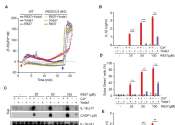A billion years of evolution suggests a new approach for Alzheimer's disease treatment
New research by academics at Royal Holloway, University of London, urges scientists that are looking to finding a cure for Alzheimer's disease to focus on the role of proteins in the brain that cause Alzheimer's disease. ...
Mar 22, 2019
0
25








